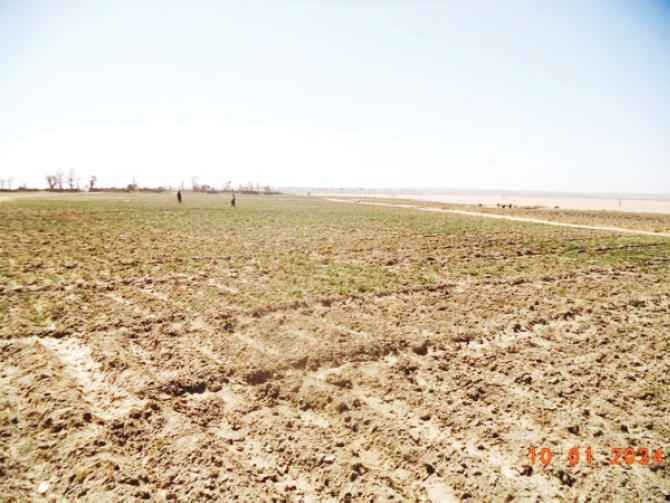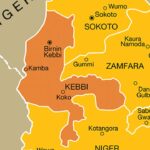The rainy season has begun in some parts of the country to mark the beginning of 2024 wet season crop production. The seasonal forecast provided by the Nigerian Meteorological Agency (NiMet) should be carefully considered by farmers.
Although the projected weather event may not occur 100 percent as predicted owing to climate change, it will assist many farmers and other sector players in making informed decisions because predictions are based on scientific data rather than mere guesswork.
The massive damage caused by the 2022 floods emphasises how important it is for farmers and other stakeholders to take weather forecasting seriously in order to ensure food security.
About five million people were impacted, according to NEMA’s estimate, with 1,987 fatalities and 2.6 million displaced, while over 58,000 hectares of farmlands with crops were destroyed.
- Dry season: Kano rice farmers decry high cost of inputs
- Niger farmers groan over rising cost of yam seedlings
The forecast for 2024 indicates that in most regions of the nation, the start of the cropping season will probably vary from normal to delay.
2024 Seasonal Climate Prediction (SCP) provided the following highlights and advisory, which can guide crop farmers from beginning to the end of the growing season.
Rainfall onset dates
The 2024 onset of rains is predicted to be delayed till around May 29 in the central states of the country. A normal onset is likely to occur over the northern states around June 13. Borno, Abia and Akwa Ibom states are predicted to have an early onset when compared to their long-term averages beginning around April 14.
Rainfall cessation dates
An early end of season is predicted between 6th October and November for parts of Yobe, Jigawa, Sokoto, Kebbi, Kano, Kaduna, Plateau, Nasarawa Taraba, Gombe, Bauchi, Cross River, Ebonyi, Ogun, and Lagos states. A late cessation is predicted between late November and December over the southern states of Bayelsa, Rivers, Akwa Ibom, Ondo, Ekiti, and parts of Edo, Delta, Ogun, Oyo, Kogi, Kwara, FCT, Niger, and Kaduna.
Plateau, parts of Gombe, Sokoto, Kebbi, and Zamfara are likely to witness early end of the growing season. Therefore, farmers in the region must take crop growing advisory seriously.
Rainfall amounts
The annual rainfall amount is predicted to be below normal over parts of Yobe, Jigawa, Bauchi, Kano, Kebbi, Gombe, Plateau, Taraba, Nasarawa, Benue, Enugu, Ebonyi, Cross River, Delta and Bayelsa states when compared to their long-term averages. However, other parts of the country are likely to observe normal to above normal annual rainfall amount.
Length of growing season
Most parts of the country are expected to experience shorter length of season, while Bayelsa, Rivers, Akwa-lbom are likely to experience a longer length of season when compared with their climatological mean. Normal to shorter length of season will likely occur in other parts of the country.
Temperature
Both day and night time temperatures are predicted to be warmer than the long-term average over: parts of the country in January, March and May 2024. However, February day and night time temperatures are predicted to be cooler than normal. Moreover, most of the north is also anticipated to be cooler in March.
Dry spells
The 2024 Prediction shows that in July, there is likelihood of a severe dry spell that may persist for more than 15 days after the establishment of rainfall in the northern states of Nigeria and northern Oyo. Moderate (16 days) dry spell in central and mild dry spell in Ogun, Osun, Edo, Enugu, Anambra and northern Cross River are anticipated during the period.
Little Dry Season (LDS)
The occurrence of 2024 LDS is projected to start from the 22™ of July — 2 of August 2024, a longer break in rainfall (LDS) is predicted over Kwara and Lagos states with a duration of more than 27 days. Some parts of Oyo, Ogun, Ekiti, and Lagos are likely to have a low to moderate event with a coverage of about 18-27days. Ondo, Edo and some adjoined areas in Kogi states may experience shorter LDS.
This prediction serves as an early warning tool to stakeholders and the general public for time preparedness and anticipatory action against weather and climate-related hazards down to local and hard-to-reach communities.
What farmers should do
NiMet has provided the following advice to crop farmers across the country:
Farmers in the areas predicted to have normal to short length of the growing season are encouraged to plant early and use early-maturing varieties of crops.
Drought tolerant and early maturing varieties should be planted in the whole north. Where an early dry spell is expected, planting should be delayed.
In the areas predicted to experience moderate to severe dry spells farmers are advised to use drought-tolerant crop varieties. Where drought-tolerant varieties are not available, farmers should adopt soil water conservation techniques such as mulching, water harvesting, tied ridge, organic fertiliser and supplementary irrigation.
Farmers should avoid fertiliser application just before it rains, in order to prevent leaching and runoff of the applied nutrient.
Farmers in coastal and wetland areas should adopt alternative and additional livelihood activities to mitigate the effect of possible flooding.
Farmers should avoid planting before the predicted onset dates.
Diversification of cultivated crops is advised in the central region of Nigeria.
Farmers in the Southwest should end the 1 season in July and start the 2 season in late August for the small season.
What government must consider
Input distribution before onset is very important. Procurement of inputs as early as possible is encouraged depending on locations.
Crop farmers are advised to irrigate in the morning and evening when necessary.
Each state should seek professional advice from relevant agencies (NiMet and National Agricultural Research Institutes.
Reinforce the practice of farmers’ traditional bimodal farming in the affected areas.

 Join Daily Trust WhatsApp Community For Quick Access To News and Happenings Around You.
Join Daily Trust WhatsApp Community For Quick Access To News and Happenings Around You.


